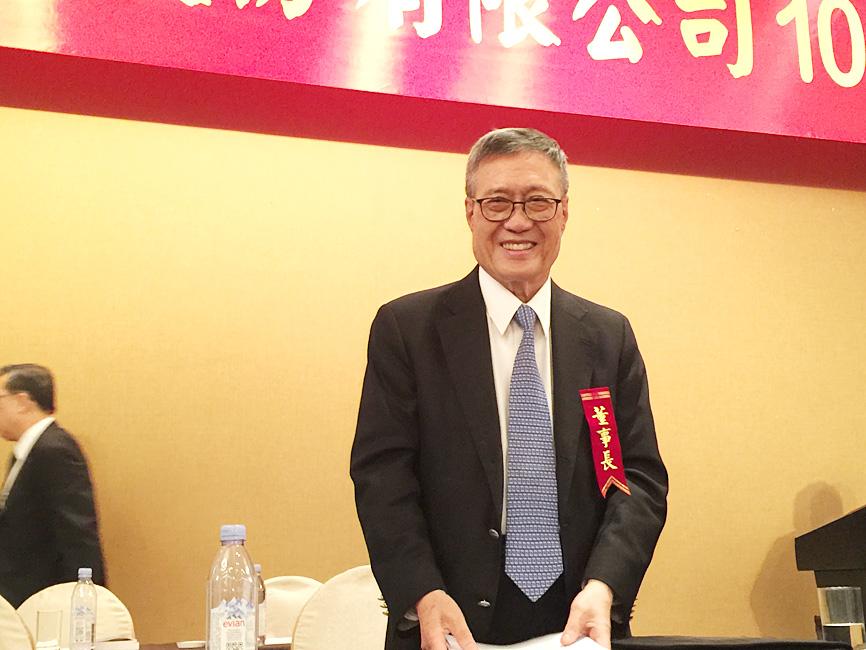Nanya Technology Corp (南亞科技) expects a further uptick in DRAM chip prices during the second half of this year, extending a three-quarters-long price uptrend, as the world’s major memorychip suppliers are being disciplined about capacity expansion.
“Based on information from the world’s top three suppliers, they have been conservative about capital spending over the past two years. The growth in [DRAM] supply this year mainly derives from technology upgrades, meaning the output increase will be very disciplined,” Nanya Technology chairman Wu Chia-chau (吳嘉昭) said yesterday during opening remarks at the company’s annual shareholders’ meeting in Taoyuan’s Nankan District (南崁).
“Overall, supply and demand should reach a balance this year based on the analysis of some research houses,” Wu said.

Photo: Chang Hui-wen, Taipei Times
Compared with stable supply growth, DRAM demand is rising rapidly as work-from-home, online learning and the stay-at-home economy boost demand for notebook computers, tablets, solid state drives and networking devices, he said.
In addition, DRAM demand is being propelled by 5G infrastructure, 5G handsets, artificial intelligence and other emerging technologies, as those devices are equipped with much bigger memory, he added.
As a result, Nanya Technology expects the DRAM industry is moving toward healthy development in the third and fourth quarters of this year.
“It looks more certain that DRAM market prices will have some upside,” Wu said.
Nanya Technology last month said that it was not sure whether the price increases would be sustained in the final quarter of this year.
There was a likelihood prices might be flat compared with this quarter, it said.
The global DRAM market grows at an annual rate of 15 to 20 percent on average each year and most suppliers target matching that pace in their capacity expansion, Nanya Technology said.
To fuel growth, Nanya Technology is developing 10-nanometer technologies, with its second-generation 10-nanometer chips scheduled to start small-volume production soon, Wu said.
The company also plans to start building a new 12-inch fab in New Taipei City’s Taishan District (泰山) at the end of this year at the earliest, he said, adding that construction would likely be completed by the end of 2023.
The company plans to invest NT$300 billion (US$10.78 billion) to make 10-nanometer chips over the next few years.
At its existing fabs, Nanya Technology is optimizing its 20-nanometer product lineups to address rising demand for chips for servers, PCs, portable devices and automotive applications, Wu said.
Shareholders yesterday approved a proposal to distribute a cash dividend of NT$1.3 per common share.
That represents a payout ratio of 52 percent based on the company’s earnings per share of NT$2.5 last year, or NT$7.67 billion net profit.

POWERING UP: PSUs for AI servers made up about 50% of Delta’s total server PSU revenue during the first three quarters of last year, the company said Power supply and electronic components maker Delta Electronics Inc (台達電) reported record-high revenue of NT$161.61 billion (US$5.11 billion) for last quarter and said it remains positive about this quarter. Last quarter’s figure was up 7.6 percent from the previous quarter and 41.51 percent higher than a year earlier, and largely in line with Yuanta Securities Investment Consulting Co’s (元大投顧) forecast of NT$160 billion. Delta’s annual revenue last year rose 31.76 percent year-on-year to NT$554.89 billion, also a record high for the company. Its strong performance reflected continued demand for high-performance power solutions and advanced liquid-cooling products used in artificial intelligence (AI) data centers,

SIZE MATTERS: TSMC started phasing out 8-inch wafer production last year, while Samsung is more aggressively retiring 8-inch capacity, TrendForce said Chipmakers are expected to raise prices of 8-inch wafers by up to 20 percent this year on concern over supply constraints as major contract chipmakers Taiwan Semiconductor Manufacturing Co (TSMC, 台積電) and Samsung Electronics Co gradually retire less advanced wafer capacity, TrendForce Corp (集邦科技) said yesterday. It is the first significant across-the-board price hike since a global semiconductor correction in 2023, the Taipei-based market researcher said in a report. Global 8-inch wafer capacity slid 0.3 percent year-on-year last year, although 8-inch wafer prices still hovered at relatively stable levels throughout the year, TrendForce said. The downward trend is expected to continue this year,

Vincent Wei led fellow Singaporean farmers around an empty Malaysian plot, laying out plans for a greenhouse and rows of leafy vegetables. What he pitched was not just space for crops, but a lifeline for growers struggling to make ends meet in a city-state with high prices and little vacant land. The future agriculture hub is part of a joint special economic zone launched last year by the two neighbors, expected to cost US$123 million and produce 10,000 tonnes of fresh produce annually. It is attracting Singaporean farmers with promises of cheaper land, labor and energy just over the border.

US actor Matthew McConaughey has filed recordings of his image and voice with US patent authorities to protect them from unauthorized usage by artificial intelligence (AI) platforms, a representative said earlier this week. Several video clips and audio recordings were registered by the commercial arm of the Just Keep Livin’ Foundation, a non-profit created by the Oscar-winning actor and his wife, Camila, according to the US Patent and Trademark Office database. Many artists are increasingly concerned about the uncontrolled use of their image via generative AI since the rollout of ChatGPT and other AI-powered tools. Several US states have adopted